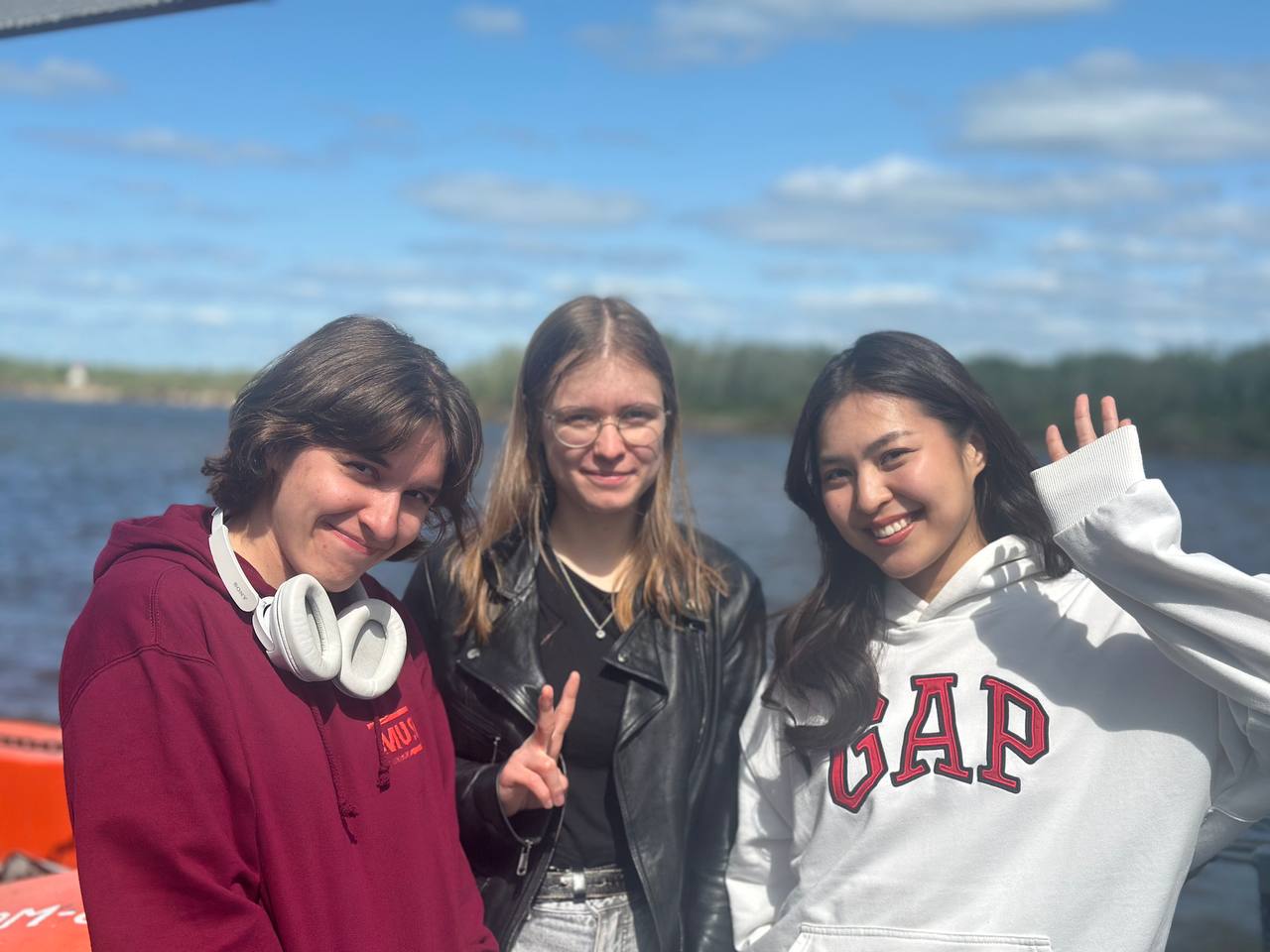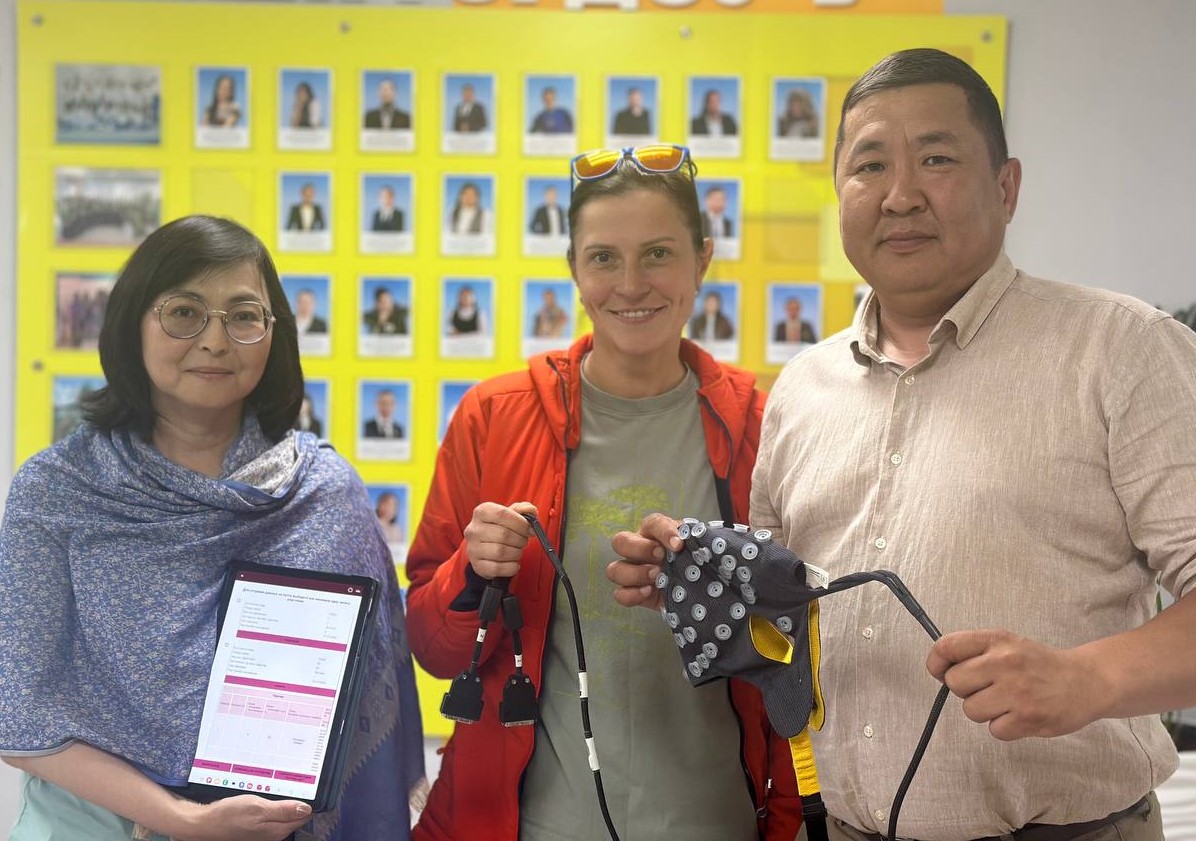Centre for Language and Brain Conducts First Neurolinguistic Field Study of Reading in Yakut

In July, a team from the HSE Centre for Language and Brain, in collaboration with the Centre for the Study, Preservation, and Development of Native Languages of the Academy of Sciences of the Republic of Sakha (Yakutia), conducted the first-ever neurolinguistic expedition to the village of Churapcha to study reading in the Yakut language using electroencephalography (EEG). For the first time, EEG data from 43 adults and behavioural data from 40 children was collected during the two-week expedition.
According to Olga Dragoy, Director of the HSE Centre for Language and Brain and head of the expedition, experimental linguistics worldwide still relies primarily on data from a small number of well-studied languages, mostly from the Indo-European family. As a result, she argues, it is methodologically unsound to draw universal conclusions about the nature of language from such a limited dataset. The objective of the Centre for Language and Brain is to expand both the geographical reach and linguistic diversity of experimental linguistics. Russia, with its multilingual population, offers unique opportunities for this, being home to languages from a wide range of families and groups.
Prior to this expedition, no psychoneurolinguistic research had ever been conducted using material from the Yakut language. The first experiment of this kind was carried out in Churapcha by a team consisting of Olga Dragoy, Olga Tuzhik, and Polina Pilipets from the Centre for Language and Brain and Nadezhda Vasilyeva from the Centre for the Study, Preservation and Development of Native Languages of the Academy of Sciences of the Republic of Sakha (Yakutia).
The choice of the village of Churapcha was intentional, as 99% of the local population speaks Yakut, making the Churapcha district a unique setting for studying native language perception in the context of active Yakut–Russian bilingualism.
During the two-week expedition, the team collected EEG data from 43 adults and behavioural data from 40 children. Adult participants were shown sentences containing incorrect tense coordination. The researchers recorded event-related brain potentials using EEG, enabling them to observe how the brain responds to different types of language errors.
‘The Yakut language distinguishes between an immediate past tense—eg, üleleetim, meaning "I have been working (recently)"—and a distant past tense, as in üleleebitim, meaning "I worked (a while ago)." We are interested in how the brains of native Yakut speakers respond to tense agreement errors between adverbs and verbs,' explains Polina Pilipets, Research Assistant at the HSE Centre for Language and Brain.
For instance, some sentences in the experiment combined the adverb bylyryyn ('a year ago,' indicating distant past) with a verb in the immediate past tense, or paired the adverb subu aghay ('just now,' indicating immediate past) with a verb in the distant past tense.

'According to preliminary surveys of native speakers, sentences that combine a distant-past adverb with a verb in the immediate past tense are perceived as more "incorrect." We expect this distinction to be reflected in the EEG signals—specifically, in the form of larger evoked potential amplitudes in response to the more prominent error,' comments Olga Tuzhik, Research Assistant at the HSE Centre for Language and Brain.
Alongside the EEG experiment, the team conducted behavioural testing with 40 bilingual children who speak both Yakut and Russian. The children completed cognitive tasks in both languages, including the RAVLT and the Trail Making Test in Russian, as well as tasks in Yakut. During the expedition, the researchers, in collaboration with linguists and native speakers, adapted the Russian-language LexiMetr test for assessing children's reading skills in Yakut and collected data in both languages.
'Adapting diagnostic tools for the Yakut language is of great importance, as it enables early diagnosis and support of children with reading difficulties. These tools are essential for both teachers and psychologists,' emphasises Nadezhda Vasilyeva, Leading Researcher at the Centre for the Study, Preservation and Development of Native Languages of the Academy of Sciences of the Republic of Sakha (Yakutia).

The expedition to Churapcha marked the first step toward a systematic study of the Yakut language using neurolinguistic methods. Moving forward, the researchers plan to examine aphasia in Russian–Yakut bilinguals. Similar studies have long been conducted in Russia with respect to the Russian language, but it remains unclear how aphasia manifests in Yakut or what specific language disorder patterns occur in native Yakut speakers. Yakutia offers all the necessary conditions for this research. In particular, the M.E. Nikolaev National Centre of Medicine is equipped with modern neurological and diagnostic facilities and has already expressed its willingness to collaborate.
'I would like to commend the excellent organisation of this expedition. It was the first time we experienced such a high level of collaboration: our colleagues from the Academy of Sciences of the Republic of Sakha (Yakutia) and the administration of the Churapcha district ensured flawless logistics, accommodation, and participant recruitment and motivation. It was truly an inspiring experience,' Olga Dragoy concluded.
See also:
HSE Psycholinguists Launch Digital Tool to Spot Dyslexia in Children
Specialists from HSE University's Centre for Language and Brain have introduced LexiMetr, a new digital tool for diagnosing dyslexia in primary school students. This is the first standardised application in Russia that enables fast and reliable assessment of children’s reading skills to identify dyslexia or the risk of developing it. The application is available on the RuStore platform and runs on Android tablets.
HSE Scientists Optimise Training of Generative Flow Networks
Researchers at the HSE Faculty of Computer Science have optimised the training method for generative flow neural networks to handle unstructured tasks, which could make the search for new drugs more efficient. The results of their work were presented at ICLR 2025, one of the world’s leading conferences on machine learning. The paper is available at Arxiv.org.
Neural Network Trained to Predict Crises in Russian Stock Market
Economists from HSE University have developed a neural network model that can predict the onset of a short-term stock market crisis with over 83% accuracy, one day in advance. The model performs well even on complex, imbalanced data and incorporates not only economic indicators but also investor sentiment. The paper by Tamara Teplova, Maksim Fayzulin, and Aleksei Kurkin from the Centre for Financial Research and Data Analytics at the HSE Faculty of Economic Sciences has been published in Socio-Economic Planning Sciences.
Mistakes That Explain Everything: Scientists Discuss the Future of Psycholinguistics
Today, global linguistics is undergoing a ‘multilingual revolution.’ The era of English-language dominance in the cognitive sciences is drawing to a close as researchers increasingly turn their attention to the diversity of world languages. Moreover, multilingualism is shifting from an exotic phenomenon to the norm—a change that is transforming our understanding of human cognitive abilities. The future of experimental linguistics was the focus of a recent discussion at HSE University.
Larger Groups of Students Use AI More Effectively in Learning
Researchers at the Institute of Education and the Faculty of Economic Sciences at HSE University have studied what factors determine the success of student group projects when they are completed with the help of artificial intelligence (AI). Their findings suggest that, in addition to the knowledge level of the team members, the size of the group also plays a significant role—the larger it is, the more efficient the process becomes. The study was published in Innovations in Education and Teaching International.
New Models for Studying Diseases: From Petri Dishes to Organs-on-a-Chip
Biologists from HSE University, in collaboration with researchers from the Kulakov National Medical Research Centre for Obstetrics, Gynecology, and Perinatology, have used advanced microfluidic technologies to study preeclampsia—one of the most dangerous pregnancy complications, posing serious risks to the life and health of both mother and child. In a paper published in BioChip Journal, the researchers review modern cellular models—including advanced placenta-on-a-chip technologies—that offer deeper insights into the mechanisms of the disorder and support the development of effective treatments.
Advancing Personalised Therapy for More Effective Cancer Treatment
Researchers from the International Laboratory of Microphysiological Systems at HSE University's Faculty of Biology and Biotechnology are developing methods to reduce tumour cell resistance to drugs and to create more effective, personalised cancer treatments. In this interview with the HSE News Service, Diana Maltseva, Head of the Laboratory, talks about their work.
‘Our Task Is to Promote and Popularise Native Languages’
The Centre for the Study of Native Languages at Dagestan State University (DSU) is actively engaged in researching the many languages spoken by the peoples of Dagestan. The republic has 14 official state languages, many of which have their own dialects and varieties. Scholars from Dagestan plan to adopt corpus-based methods of linguistic research used at HSE University and intend to collaborate with HSE’s Linguistic Convergence Laboratory. The HSE News Service spoke with the centre’s Director, Prof. Marina Gasanova, who is currently undertaking a research placement at HSE University.
Master’s Students of HSE, University of Campinas, and Tsinghua University Publish Joint Student Research Collection
Master’s students of the HSE ISSEK programme ‘Science, Technology and Innovation Management and Policy’ have released a joint research collection with the University of Campinas (Brazil) and Tsinghua University (China) titled ‘Being Innovative or Being on the Safe Side—Managing the Risk of Failure.’ The authors explore how organisations perceive risks and embrace innovation within different cultural contexts.
‘A Turn Away from Stereotypes’: Moscow Hosts ‘Researching the Deaf Community’ Conference
On October 17–19, 2025, the third annual interdisciplinary conference ‘Researching the Deaf Community 2025: on the Periphery of Attention’ took place at GES-2 House of Culture in Moscow. The event was organised with the participation of the HSE International Laboratory for Social Integration Research. HSE University Vice Rector Irina Martusevich addressed attendees at the opening ceremony.


